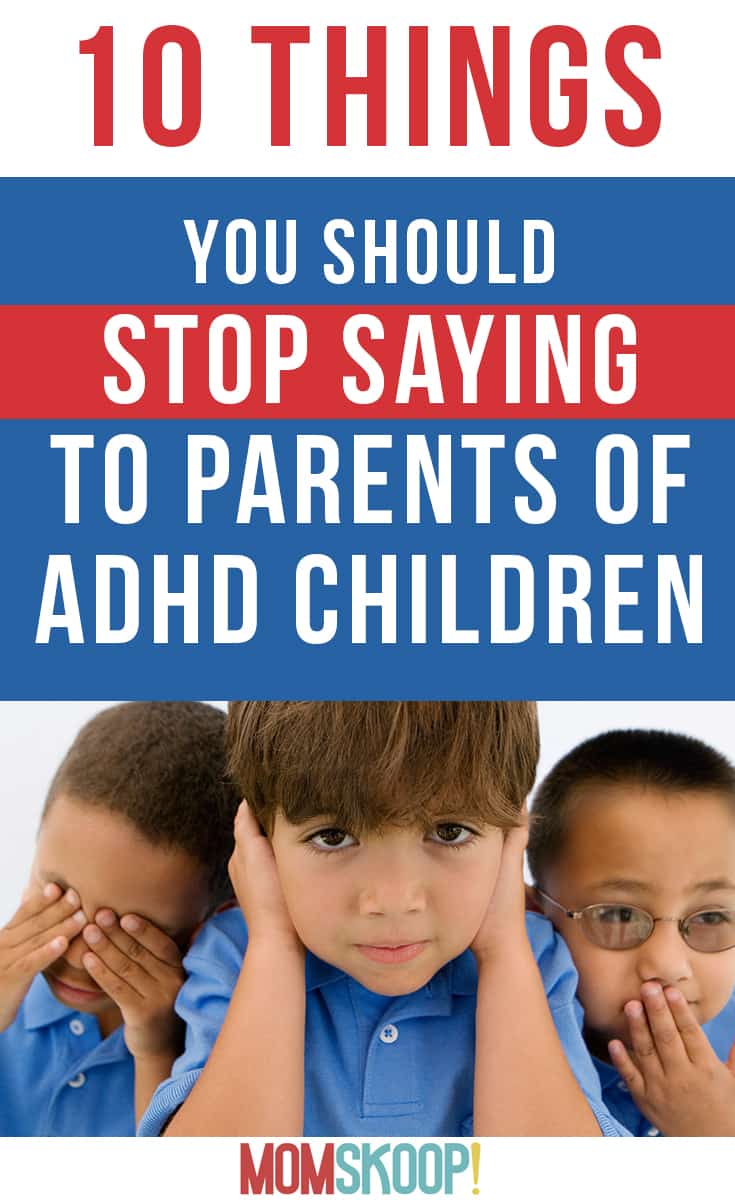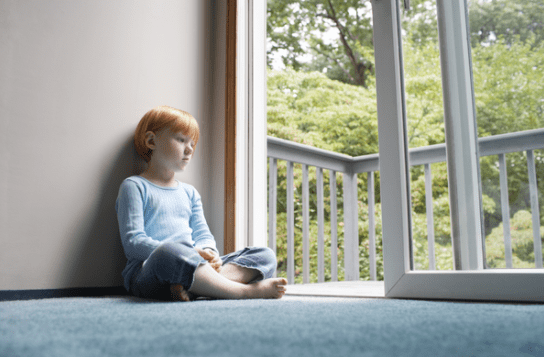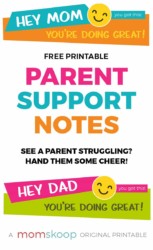Even with all of the modern research and medical breakthroughs, parents of children with ADHD still face a myriad of myths and misplaced "help" from strangers, friends, and even family. While people may think they are helping, often their comments only serve to further alienate and guilt parents who are just trying their best to improve their child's life.
10 Things You Should Stop Saying to Parents of ADHD Children
1. My mother/grandmother/crazy old neighbor cured me with....
We've heard it all. Diet, meditation, tapping, herbs, oils. And, chances are, we've already tried a few of them. The worst is hearing "I never needed medication". When you say that, we're thinking, "Well good for you. Aren't you awesome." and probably a few things that aren't as nice.
We aren't sitting around waiting for an answer to appear out of thin air. We spend a lot of time researching and seeking out options.
No one wants their child on medications that cause side effects and drain their wallets. Unfortunately, natural doesn't work for everyone. Many of us have had great success with medical intervention and, just because you are seeing one behavioral moment doesn't mean there hasn't been great progress already made that you don't know about.
Need Resources? Check out these
books on Parenting an ADHD Child
2. If I ever have an ADHD child...
Anything you say at the end of this sentence won't matter to us. There is no preparation for having a child with ADHD. It doesn't matter how many articles you've read or how many friends have ADHD children around you. You do not know how you will parent unless faced with it.
Even those of us who do have ADHD children go through phases that completely change how we parent. We evolve and adapt with our kids. What works today may not work next year. "If I ever" is meaningless and just comes off as "I would do it much better."
3. ANYTHING about vaccines
No matter if the parent is for or against vaccines, mentioning them is 100% useless and only serves to make your motives seem selfish. There are only two sides to this and neither one benefits.
If they have vaccinated - you are just saying it's their fault their child has ADHD. Is this really helping? Does it change the situation at all? Not one bit.
If they haven't vaccinated - then you're preaching to the choir, right? Still not helping them.
4. Have you tried...
Yes. Yes we have. We've tried that and a few other things you haven't even heard of. Next?
5. What you should do is...
Unless you're about to finish this sentence with the name of a neurologist that really helped your ADHD child or a suggestion of the best ice cream parlor to visit when they have a great day - drop it. Seriously. Nutshell: we don't care what you think we should do. (Sorry family members, this goes for you too)
6. He/She just needs more discipline.
When someone says this to us, it's a giant red flag that you have no knowledge of, or experience with, ADHD (or probably any other neurological disorder). Discipline requires the subject to have control over their thoughts, emotions, and reactions. It requires a child to have the wherewithal to realize consequences before they act, hence ignoring the consequences they know are coming. All of these judgements can be severely impaired with ADHD children.
That doesn't mean we don't have rules and punishment. We absolutely do. But, we temper those according to what we know our child can and can't process. We aren't lazy or aloof. We know what our child is capable of understanding and/or controlling preemptively.

7. I totally get it. My child (insert "typical" kid behavior here) all the time.
This happens so often, and yes - it's because you're trying to let us know you aren't judging and identify with having a 'tough day'. We get that. But, here's the thing: your son or daughter crying for 2 minutes because they can't buy a toy isn't the same as when we have to pick up our 9 year old and physically carry them out of the store in hysterics simply because their shoe won't stay tied or having to pull over to the side of the highway to handle a meltdown because "the seatbelt is touching my neck".
8. Can't you just talk to him/her about their behavior?
ADHD and other neurological disorders can't be "willed" away. While an adult may be able to control the outward signs of their ADHD after years of practice, a child is often helpless to the unordered whims of their mind. When my son is in the middle of one of his meltdowns, he isn't actually thinking - he's feeling. He's reacting to something he has no control over. He says, "My mind is arguing with me", and having talks about that won't change his feeling of helplessness. That requires methods, time, and - in our case - medication.
9. Just let them cry it out. You can't let them win all the time.
If I had a quarter for every time someone said, "If he starts getting upset, just leave the room. Don't entertain that behavior!". This isn't a temper tantrum over not getting a second cookie.
While a neurotypical child will eventually get bored and stop crying once they realize a) they won't win and b) they don't have an audience - children with ADHD and other disorders don't have that "off" switch. Mainly because they aren't doing it to get a reaction from the adult.
They are honestly distraught, sometimes confused. That doesn't go away simply because they are alone. Leaving can sometimes make the episodes worse, feeling as if they have been abandoned or that "no one cares".
10. You're spoiling him.
"Pick your battles" is something heard often in our house, and I suspect many other homes like ours. We often have to choose between being "right" and watching a child crumble. We also have to think into the future: how will this affect the rest of the day. One meltdown can change the child's mood for the rest of the day.
Example: We get dressed at 8:00 am for school. One morning he wants 5 extra minutes to finish his coloring page. While those 5 minutes do bend the rule, is it worth a possible meltdown? It can make him more sensitive to daily triggers and be the deciding difference between a good day at school or sitting in the principal's office. Which is more important?
We aren't spoiling - we are weighing the consequences.
So what CAN you say? Plenty!
- There are so many treatment options these days. I hope you find the one that works for you.
- I can't imagine how hard it must be, but I'm here if you need to talk.
- I'm sorry you guys are having a hard day. Is there anything I can do to help?
- I can watch your cart for you, if you need to step away for a moment.
- I think you're doing a great job.
- (offer a smile or a hug)
You can also just say what you'd say to any other parent: So good to see you! Let's grab coffee sometime. Have you seen that new movie? etc.
What most ADHD parents want most is to be seen and treated like every other parent. We're already spending so much of our time in a different world of control, balance and prevention. We don't need to be reminded of the trials our children are dealing with. We already know. Just talk to us. Say hello, offer a smile.
If you see us having a difficult time with a meltdown, know that we've been here before. We've got this. But, we need space. It's not that help offends us, we know you mean well. But, another person coming into the situation often makes it worse. It disrupts the methods we have in place for a situation like this.
While this article deals with parents of children with ADHD, it's a good rule of thumb to avoid these topics when it concerns any neurological or sensory disorder. Remember: a simple smile goes a long way.











Comments
No Comments